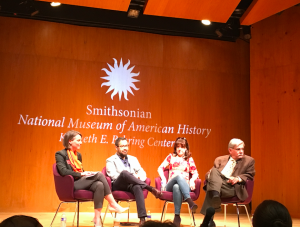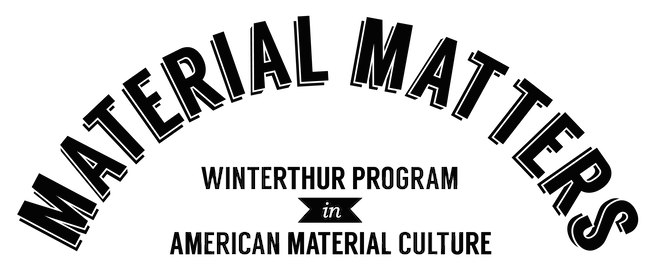Food History, Food Activism, and “Chewy” Words
This weekend I had the opportunity to attend the 3rd annual Smithsonian Food History Weekend at the National Museum of American History. It was a chance for museum professionals, researchers, chefs and cooking enthusiasts, and the general public to come together in a dialogue about the current state of food history and critical foodways scholarship in America. Friday’s events included four roundtable discussions centering on the idea of migration and how changing national and local demographics influence our understanding and appreciation of culinary traditions, labor practices, and identity development.

Image: Participants from the second panel on stage during their discussion on labor practices in food systems. Left to Right: Moderator Theresa McCulla, National Museum of American History; Jose Oliva, Co-Director, Food Chain Workers Alliance; Tracie McMillan, author and investigative journalist at the Schuster Institute; and Dominic Pacyga, author and former Professor of History at Columbia College/Chicago.
Francis Lam, host of public radio’s The Splendid Table, moderated the first panel and introduced the idea of “chewy” words – topics that are a mouthful to address and take a lot of work before they are satisfyingly manageable to consume. Ideas like “cuisine,” “cultural appropriation,” “food sovereignty,” and “authenticity” were some of the chewy words that panelists grappled with throughout the day’s events. These are large, complicated topics, and there were certainly tense moments of disagreement among panelists, but it was refreshing to see a myriad of honest and critical approaches to the ways the American public is dealing with the impact of historical and current migration patterns in our food systems and daily eating habits.

Image: Participants from the third roundtable discussion on how migration influences culinary traditions. Left to Right: Moderator Lavanya Ramanathan, writer/editor at The Washington Post; Daniel Bender, author and professor with the University of Toronto; author Toni Tipton-Martin; David Shields, author and professor at the University of South Carolina; and Lois Ellen Frank, chef and author.
Food studies have long been an area of my personal interest within the museum and material culture world. I have often found that food is a low-pressure and enjoyable access point for engaging with the public about historical topics and ideas because everyone has had some sort of interaction with food items or the foodways system. In terms of research, food often becomes one of the best tools for studying group dynamics. Culinary traditions, cooking techniques, and ingredient choices often speak to how and why different population groups include, exclude, manipulate, influence, appropriate, or reject other groups and their traditions or cooking styles. Food can be incredibly revealing about the creation of our personal and community identities.

Image: Participants in the final panel regarding the story-telling often associated with recipes and food studies. Left to Right: Moderator Simon Majumdar, food writer, author, and broadcaster; author Joan Nathan; and Jessica Harris, culinary historian and author.
This event gave me the opportunity to meet and discuss food history with some of my favorite historians and foodways related professionals. But I was also deeply challenged by their work and discussion of many difficult subjects. I came away from the weekend committed to learning more not just about where the food I eat comes from, but also the labor practices involved with getting it to my plate and the hidden culinary traditions, appropriated or not, that might be associated with it. I also really began to question my own culinary legacy and what kind of messages I wanted to leave for the foodways scholars of tomorrow. The Smithsonian’s Food History Weekend was an eye-opening, enjoyable, and exciting experience, “chewy” words and all.

Image: The four books I purchased at the event. Clockwise from top-left: The Jemima Code: Two Centuries of African American Cookbooks by Toni Tipton-Martin; The Culinarians: Lives and Careers from the First Age of American Fine Dining by David S. Shields; The Migrant’s Table: Meals and Memories in Bengali-American Households by Krishnendu Ray; and High on the Hog: A Culinary Journey from Africa to America by Jessica B. Harris.
I’ve definitely got my reading cut out for me now!
By Rachel Asbury, WPAMC Class of 2018

Leave a Reply